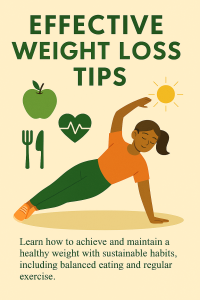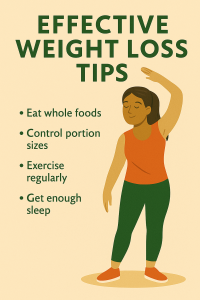
Effective Weight Loss: A Sustainable Guide to Healthier Living
Effective Weight Loss: A Sustainable Guide to Healthier Living
Effective weight loss doesn’t happen overnight. It requires realistic goals, a sustainable plan, and commitment. Losing weight is a common goal for many people, but achieving it in a healthy and sustainable way can be challenging. With countless fad diets, quick fixes, and conflicting advice available, it’s important to focus on proven strategies that promote lasting change. Weight loss should never be about deprivation or extreme measures—it’s about creating a lifestyle that supports both your physical and mental well-being.
Understanding Weight Loss
Weight loss occurs when your body burns more calories than it consumes. This is often referred to as creating a “calorie deficit.” While this concept sounds simple, various factors such as metabolism, hormones, stress levels, and sleep quality can influence how your body gains or loses weight. This is often referred to as creating a “calorie deficit.” source (CDC – Healthy Weight).
Why People Struggle With Weight Loss
Many individuals find it difficult to lose weight and keep it off because of:
- Unrealistic expectations
- Emotional eating
- Lack of physical activity
- Inconsistent routines
- Stress and poor sleep
- Underlying medical conditions
Understanding these barriers is the first step toward overcoming them.
Setting Realistic Goals
Successful weight loss begins with setting achievable goals. Losing 0.5 to 1 kilogram (1 to 2 pounds) per week is considered safe and sustainable. Tracking progress through measurements, photos, or how clothes fit can be more encouraging than relying solely on a scale.
Effective Weight Loss Tips

A balanced diet plays a critical role in weight loss. Consider the following tips:
- Eat Whole Foods: Prioritize vegetables, fruits, whole grains, lean proteins, and healthy fats.
- Watch Portion Sizes: Overeating healthy food can still lead to weight gain.
- Stay Hydrated: Sometimes thirst is mistaken for hunger.
- Limit Processed Foods: They often contain high amounts of sugar, salt, and unhealthy fats.
- Eat Mindfully: Avoid distractions while eating and pay attention to hunger cues
- Prioritize vegetables, fruits, whole grains, lean proteins, and healthy fats.
Exercise and Physical Activity
Regular movement helps burn calories and build muscle, which can boost metabolism. Aim for:
- 150 minutes of moderate aerobic activity (e.g., brisk walking) per week source (WHO Guidelines)
- Strength training exercises twice a week
- Incorporating movement into daily life (e.g., taking stairs, walking meetings)
Consistency is more important than intensity, especially for beginners.
Sleep and Stress Management
Poor sleep and chronic stress can lead to weight gain by disrupting hormones like cortisol and ghrelin. To support weight loss:
- Aim for 7–9 hours of quality sleep per night
- Practice relaxation techniques such as meditation, deep breathing, or yoga
- Avoid screens before bed and establish a calming nighttime routine
- Practice relaxation techniques such as meditation, deep breathing, or yoga Why Mental Health Matters
The Role of Mindset
A positive mindset and patience are essential. Rather than punishing yourself for setbacks, focus on progress and self-compassion. Celebrate non-scale victories, like increased energy or improved mood. Remember, weight loss is a journey, not a race.
Avoiding Fad Diets and Quick Fixes
Diets that promise rapid results often lead to yo-yo weight cycling and can harm your metabolism. Avoid plans that:
- Eliminate entire food groups
- Rely heavily on supplements
- Severely restrict calories
Instead, aim for a balanced, flexible eating pattern you can maintain long-term.
Tracking Your Progress
Monitoring your habits can help you stay accountable. Consider:
- Keeping a food journal
- Using fitness or calorie-tracking apps
- Regularly reviewing your goals and adjusting as needed
But don’t become obsessive. Tracking should be a helpful tool, not a source of stress.
When to Seek Professional Help
If you’re struggling with weight loss despite your best efforts, consult a healthcare provider. Dietitians, nutritionists, and personal trainers can offer tailored advice and support. Sometimes, weight issues are linked to medical conditions like thyroid disorders or PCOS.

Final Thoughts
Weight loss is not about perfection—it’s about progress. Focus on building habits that support your overall health, not just your appearance. With consistency, patience, and self-kindness, meaningful results are not only possible but sustainable. A healthier you is within reach—one step, one choice, and one day at a time.